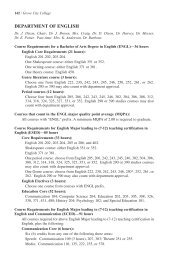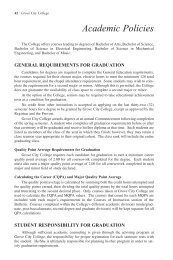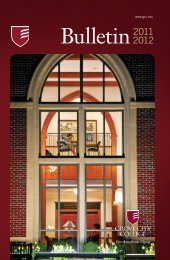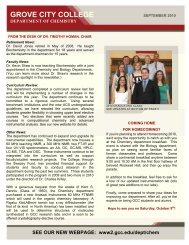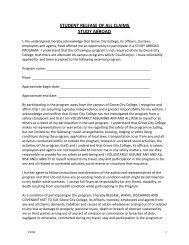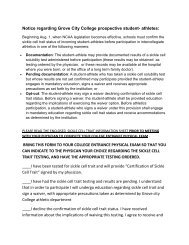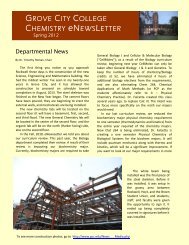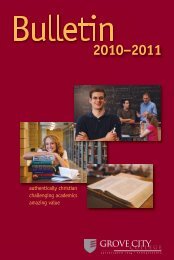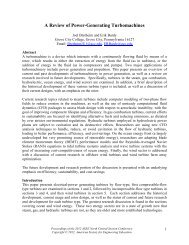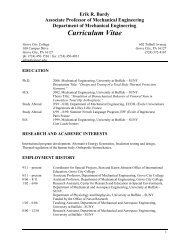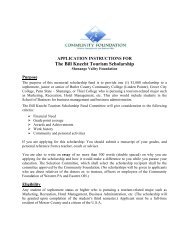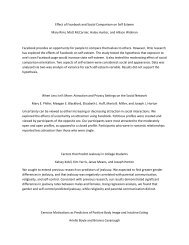2009–2010 - Grove City College
2009–2010 - Grove City College
2009–2010 - Grove City College
You also want an ePaper? Increase the reach of your titles
YUMPU automatically turns print PDFs into web optimized ePapers that Google loves.
56 / <strong>Grove</strong> <strong>City</strong> <strong>College</strong><br />
HUMA 102. CIVILIZATION AND THE BIBLICAL REVELATION. A study of Christian revelation<br />
and how it influenced the course of Western civilization. It focuses on key texts that are foundational<br />
for theology, cosmology, epistemology, human nature, society, and ethics. This course contains<br />
the second component of the across-the-curriculum Information Literacy (IL) requirement. The<br />
year-long course sequence of Religion 211 and 212 may substitute for this course. Similar courses<br />
taken at other institutions will transfer as elective credit and may not be used to fulfill this requirement.<br />
Prerequisite: Humanities 101 or concurrent with Humanities 101. Semester course, three hours.<br />
HUMA 201. CIVILIZATION AND THE SPECULATIVE MIND. An analysis and defense of the<br />
Christian worldview. Other major contemporary worldviews such as naturalism, existentialism, pragmatism,<br />
postmodernism, and humanism are also examined. In addition, the course focuses on historical<br />
and contemporary views of society and ethical issues and problems. This course completes the<br />
across-the-curriculum Writing Intensive (WI) / Information Literacy (IL) requirement. Prerequisites:<br />
Humanities 101 and 102. Students substituting Religion 211 and 212 for Humanities 102 must take<br />
Humanities 101 and either Religion 211 or 212 as prerequisites for this course. Similar courses taken<br />
at other institutions will transfer as elective credit and may not be used to fulfill this requirement.<br />
Semester course, three hours.<br />
HUMA 202. CIVILIZATION AND LITERATURE. A study of great works of literature that represent<br />
the major periods in the history of Western civilization. The course explores the nature of God<br />
and humanity, the nature of good and evil, the meaning of moral choice, the purpose of life, and the<br />
meaning of salvation. Semester course, three hours.<br />
HUMA 301. CIVILIZATION AND THE ARTS. An examination of outstanding works of visual art<br />
and music that represent the major periods in the history of Western civilization. The course examines<br />
the nature of God, the ways people have expressed their understanding of God’s nature in the arts, the<br />
ways people have seen themselves throughout Western history, and the purpose of life.<br />
Semester course, three hours.<br />
HUMA 302. MODERN CIVILIZATION IN INTERNATIONAL PERSPECTIVE.<br />
An exploration of the seminal ideas, major movements, decisive events, and key individuals in world<br />
civilization since the American and French revolutions. Especially emphasized are the emergence and<br />
operation of, and the challenges to, free institutions and the issues of constitutional government,<br />
reform, prosperity, equality, and social mobility. Semester course, three hours.<br />
STUDIES IN SCIENCE FAITH AND TECHNOLOGY (SSFT)<br />
Among other things, courses in this category explore the relationship between science and religion,<br />
technology and faith, technology and ethics, the guidance which ethical analysis brings to scientific<br />
and technological endeavors, and the basic presuppositions and underpinnings of science and<br />
Christian faith. All students must take one course from the following three choices:<br />
SSFT 208—Science, Technology, and Society<br />
SSFT 210—Science and Religion<br />
SSFT 212—Science, Faith, and Technology<br />
Most Arts and Letters majors, as well as math, computer information system and computer science<br />
majors should complete the SSFT requirement by the end of the sophomore year. Biology, chemistry,<br />
physics, engineering and entrepreneurship majors should complete the SSFT requirement by the<br />
end of the junior year.<br />
SSFT 208. SCIENCE, TECHNOLOGY, AND SOCIETY. This course is designed to explore the intersections<br />
between Christian faith, society, and technology, broadly defined. We live in a technological age.<br />
More than the mere application of new inventions and material goods, technology has cultural/social, organizational,<br />
and material aspects to it. This course will explore the social impetus for technological innovation,<br />
the history of technology with an emphasis on technology and 20th century American life, several<br />
arenas of social life that are impacted by technology, and finally the relationship between Christian faith<br />
and technological progress. This final theme will be woven into all the others, though we will take time at<br />
the end of the class to think more explicitly about how Christians might approach technology.<br />
Offered periodically, three hours.



